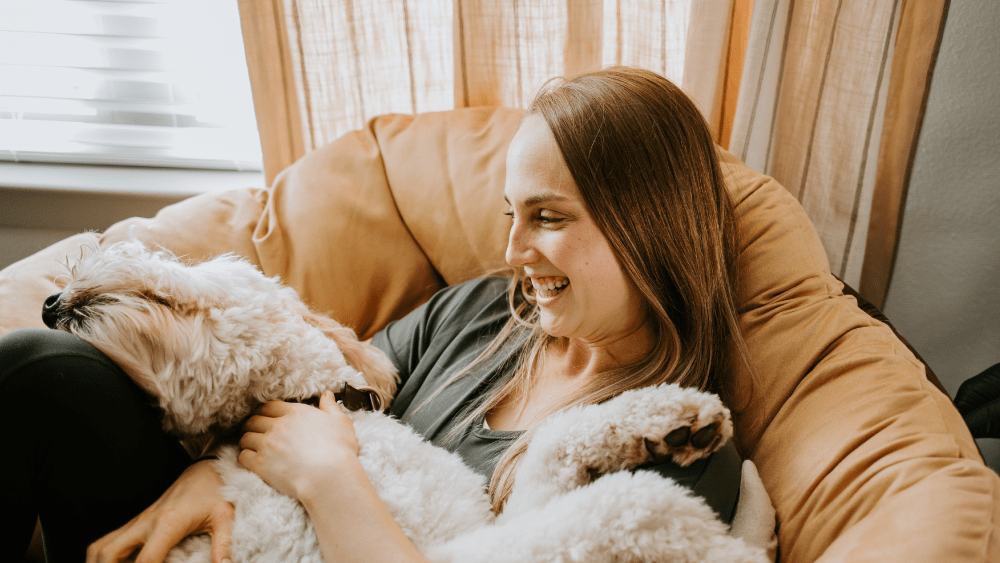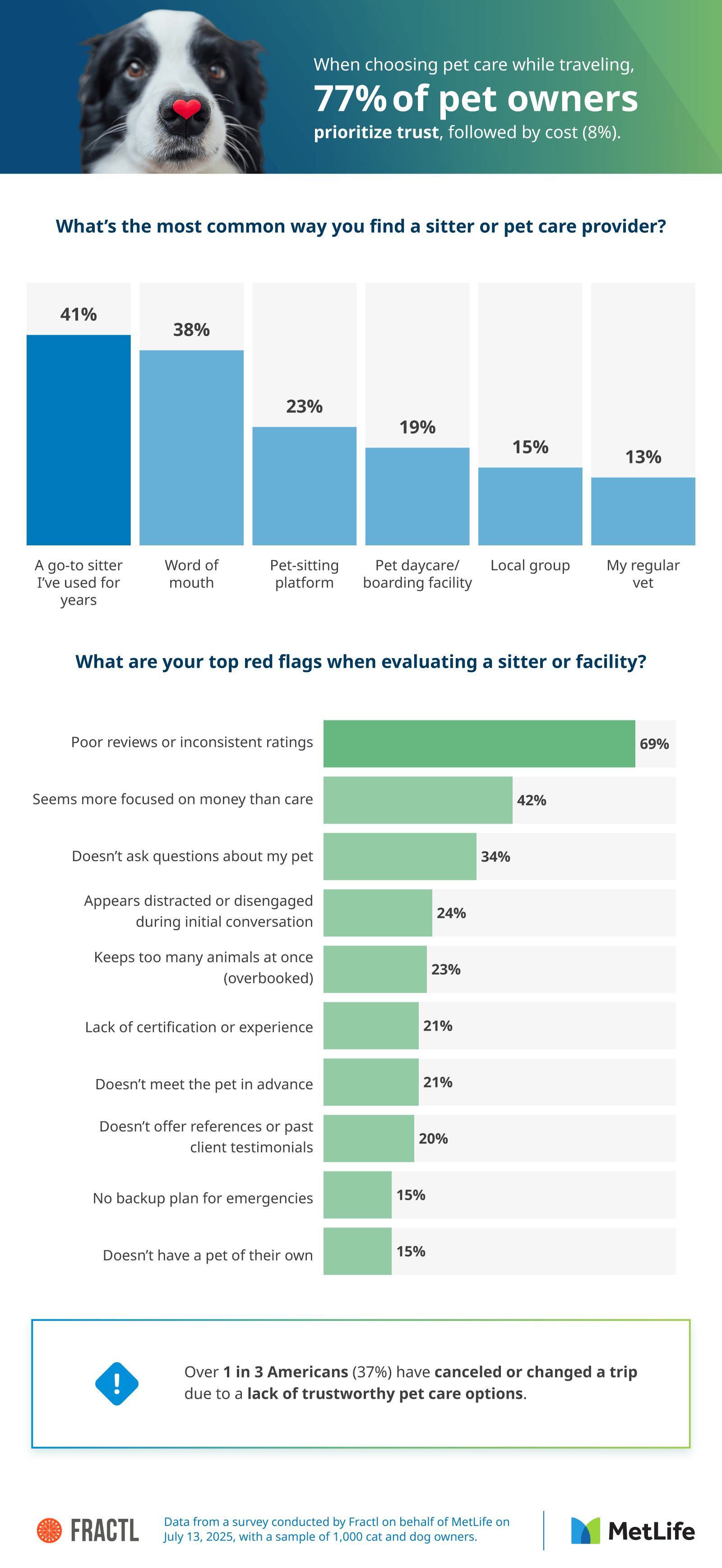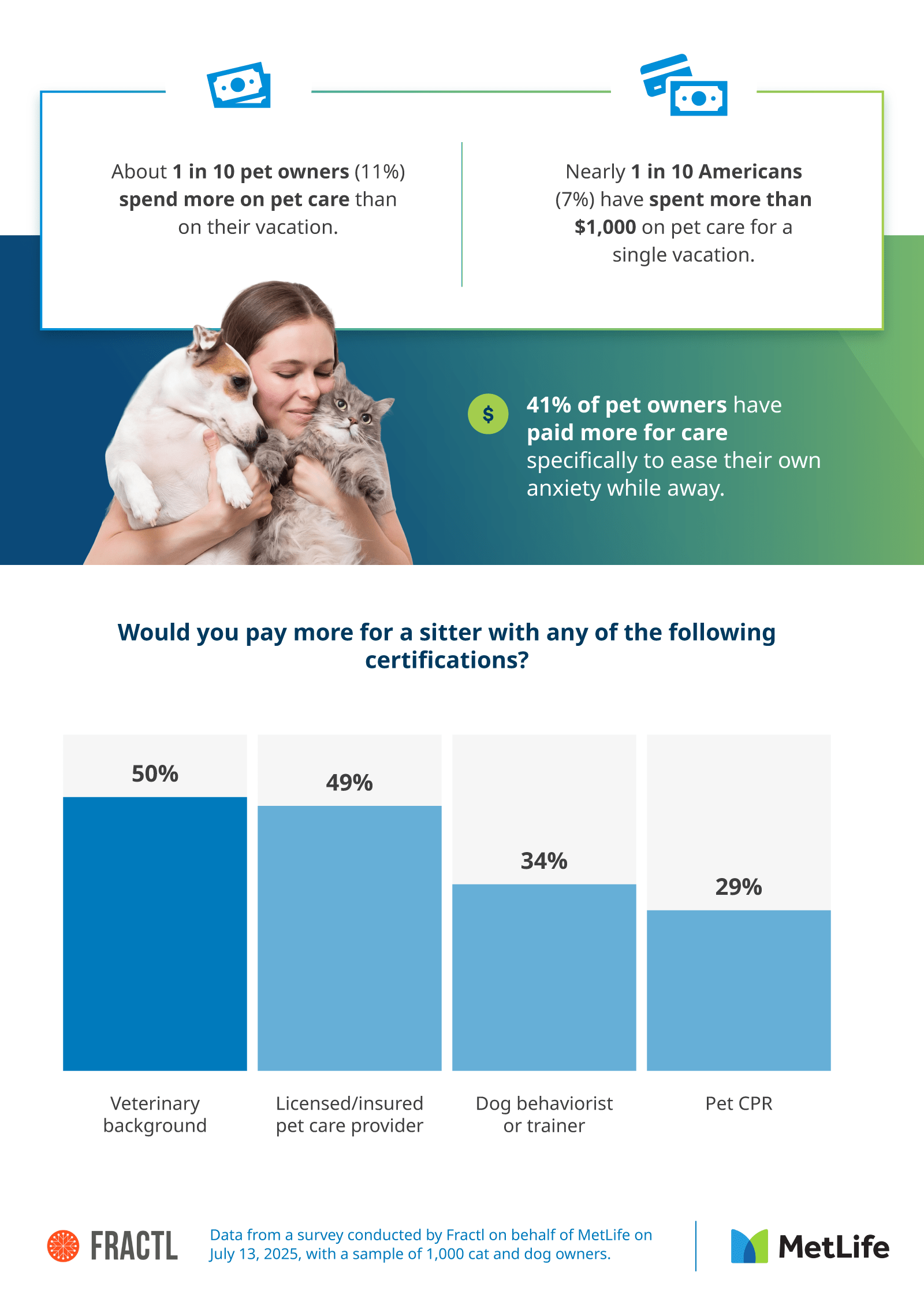Travel should be a time to unwind, but for many pet owners, it brings a wave of anxiety. Leaving beloved pets behind isn't easy, especially when trust in available pet care options is shaky.
MetLife commissioned a survey of 1,000 American pet parents to understand their concerns and experiences with sitters, boarding facilities, and pet care apps. Their responses reveal the emotional, financial, and logistical weight behind every decision.
Key Takeaways
- Over 1 in 3 Americans (37%) have canceled or changed a trip due to a lack of trustworthy pet care options.
- Over 1 in 4 Americans (29%) have had a negative experience with someone watching their pet.
- Roughly 1 in 10 pet owners (11%) admit to spending more on pet care than on their actual vacation expenses.
- Pet owners are over 3 times more likely to be stressed by a bad pet-sitting experience (76%) than by missing a flight (24%).
- Over 2 in 5 Americans (41%) have felt more guilt leaving their pet than a friend or partner. Millennials (43%) are the most likely to feel this, followed by Gen X (42%), baby boomers (40%), and Gen Z (38%).
Who Pet Owners Trust With Their Pets
Choosing the right caregiver brings peace of mind when you have to leave your furry friend behind. Trust ranks highest among priorities when pet owners are making care decisions.
More than one-third of Americans (37%) said they've changed or canceled travel plans because they couldn't find someone they trusted to watch their pet. Millennials were the most likely to report this (41%), followed by Gen X (38%), baby boomers (33%), and Gen Z (28%). Nearly a third of pet parents (30%) said they'd trust a highly rated stranger on a pet-sitting app over a well-meaning friend.
These decisions aren't made lightly. Sixty-one percent of pet owners said they always meet potential sitters in person, and nearly half (49%) interview two or more before choosing.1 Once they find someone they feel good about, most owners (82%) leave behind written care instructions or an emergency contact plan to help keep their pets safe and comfortable.
Still, negative experiences happen, and when pet care goes wrong, the emotional toll is high. Over 1 in 4 Americans (29%) have had something go wrong when leaving their pet with someone. About 76% of pet owners said they feel more stressed by a bad pet-sitting experience than by missing a flight. They are more than three times as likely to be upset by sitter trouble than by a travel delay.
Pet-sitting platforms were the most common source of trouble, with 40% of users reporting issues. The top complaints included suspected neglect or lack of supervision (36%), sitters failing to follow instructions (35%), and pets showing signs of stress or behavioral changes afterward (33%). Some owners also said their pets were left alone too long (32%) or weren't fed properly (28%). Others noted poor communication (27%), damage to their home (18%), injuries (17%), or even cases where their pet escaped or went missing (9%).
What Pet Owners Sacrifice for Peace of Mind
Pet care decisions can be both financial and emotional. Many owners go above and beyond, making real sacrifices to ensure their pets are safe, happy, and well cared for while they're away.
Over 1 in 10 Americans (11%) said they've spent more on pet care than on their own vacation. This was more common among millennials (12%), Gen X (11%), and Gen Z (10%), who were at least five times more likely than baby boomers (2%) to report this. To pay for pet care, 40% charged the expense to a credit card, averaging $300 per trip. Another 1 in 20 (5%) used "Buy Now, Pay Later" services to cover the cost, and 7% downgraded a trip just to afford better care.
Gen X (10%) was the most likely to have spent over $1,000 on pet care for a single trip, compared to millennials (8%), Gen Z (4%), and baby boomers (4%). Forty-one percent of pet owners said they have paid more to feel less anxious while away. Many were also willing to pay extra for caregivers with professional credentials, such as those with a veterinary background (50%) and licensed/insured providers (49%).
When leaving a pet behind, 41% of pet parents said they've felt more guilt than when leaving a partner or friend. Some try to stay connected, with 28% having video-called their pets during a trip. Others change their plans entirely. Twenty percent of Americans have skipped a trip due to pet care concerns, and 16% have cut vacations short to return home. Interestingly, nearly half (48%) said they would trust an AI-enabled device to help monitor their pets.
These choices, both financial and emotional, highlight the deep responsibility pet owners feel. For many, peace of mind means putting their pet's well-being first, even if it means giving up a little of their own.
Conclusion: Trust Is the True Luxury in Pet Care
As more Americans weigh travel plans against their pet's well-being, the importance of finding dependable, compassionate care becomes clear. Whether it's canceling a trip, shelling out for premium sitters, or calling to say goodnight over video, pet parents are showing just how much their animals mean to them.
Methodology
This survey, conducted by Fractl on behalf of MetLife on July 14, 2025, examined 1,000 American pet owners' emotional trust, financial cost, and logistical stress when choosing pet care during travel. The average age of respondents was 39; 52% were female, 46% were male, and 2% were nonbinary. Generationally, 5% were baby boomers, 28% were Gen X, 50% were millennials, and 17% were Gen Z.
About MetLife Pet Insurance
MetLife Pet Insurance provides comprehensive insurance solutions for pets, offering pet owners financial security and peace of mind when it comes to veterinary care. Depending on your level of coverage and the plans you choose, we can cover everything from routine checkups to emergency services. Help your pets get the care they need and worry less about the costs.
Fair Use Statement
If you'd like to share insights from this article, you're welcome to do so for noncommercial purposes. Please provide a link to this page and credit MetLife Pet Insurance as the source.



